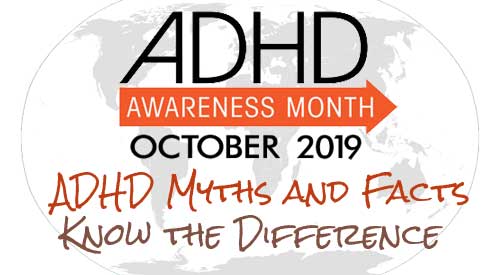Each October, ADHD Awareness Month, we encourage you to learn more about the myths and facts.
ADHD stands for attention deficit hyperactivity disorder. It is a medical condition. A person with ADHD has differences in brain development and brain activity that affect attention, the ability to sit still, and self-control.
Over 6 million children ages 4-17 have a diagnosis of ADHD and nearly 2 of 3 children with current ADHD have at least one other mental, emotional, or behavioral disorder. ADHD can interfere with a child’s ability to succeed academically, socially and emotionally. If you suspect your child may have ADHD have them evaluated by a professional.
Myths and Facts about ADHD
“Brad’s Essay”
It is as if I have just run into a bank of fog on a deserted road, all sound deadened. But as all predominant sounds recede, other sounds burst forth, sounds that would have been masked by the earlier clamor. A shoe squeaks its way down the hallway. I immediately turn my gaze to my left sandal, examining the well-worn tread. I’m sure with just a little slack in my step, that I too could replicate that sound. Wow, my foot is dirty. I guess I shouldn’t have played ultimate Frisbee on the muddy field last period. Breaking my train of thought, a girl’s cough echoes through the room. As it dies the void of silence is replaced by a high pitched hiss emanating from the florescent lights. I think about what causes this noise. I know that some molecule, I think my chemistry teacher said it was sodium, races back and forth, creating energy in the form of light. I wonder how all those molecules maintain their perpetual motion.
“You should be finished with the multiple choice now and you should start your essay,” the teacher interrupts. I glance at my blank pages and suddenly panic. As I force myself to read the first question, I become so nervous about the time that I lose my place and have to start reading from the beginning.
A.D.D. has won another round and I feel defeated. Unfortunately, I have felt this way on too many other occasions. One time when I took the SAT, I bubbled in my name incorrectly, when I only had to fill-in four circles. My math teachers wonder why I don’t try harder to eliminate what appear to be simple, careless errors. Ironically, I scored over 700 on that math SAT, allowing me to demonstrate that I really had mastered the material. I have sat through lectures desperately attempting to take notes. When I discuss with others what I thought was the lesson, I realize that I only processed a fragment of what was presented. When I sit down to execute a project, I struggle to determine the sequence of steps needed to get me going, especially the arduous task of starting. I feel overwhelmed and hopeless, believing that there must be some simpler way to approach the task, yet it eludes me. Succeeding in a school as demanding as (the school he attended), while dealing with the complications inherent in A.D.D., has only compounded my problems.
Though I have a learning disability, I am willing to try anything to overcome my challenges. In fact, I now find that, with determination and resourcefulness, I can master the material and succeed. First, I take medication, although I know that some of my friends have refused to avail themselves of this opportunity. However, medication alone is not an answer. For example, I must be an active student in the evening when I am no longer medicated, yet I cannot take more medication because insomnia is a common side effect. I’ve recently developed the discipline to combat this problem by working ahead and utilizing whatever morning times are available. Furthermore, I have found that breaking my work into smaller, bite-size pieces makes me more productive and the challenge less overwhelming. In addition, I know when to seek appropriate assistance. For example, when note taking is difficult for me, I tape lectures, review notes with peers, and seek out the teacher, as needed. Most importantly, I take advantage of the services of an educational therapist and we collaborate to develop specific techniques to deal with various problems as they arise.
I have seen myself evolve into a more mature and proactive student. This has yielded my best quarter thus far in my high school career. I currently have A’s in half my academic courses and strong B’s in my others as per my first quarter progress report. I now know that, with a committed attitude and refined study techniques, I can continue to be successful at whatever academic endeavors I choose. Further, I have discovered the ultimate tool for increasing my focus and attention: my new-found passion for computer programming.
My fingers attack the keyboard, with confidence in every stroke. The necessary code flies from my brain to my fingers, almost without thought. The first hurdle arises, and I pause with the excitement at the first opportunity for challenge. I mentally sift through two years of training using the language C++ and I derive the solution. I wait with trepidation as the computer links the source code and consumes every character I have fed to it, speculating about how many syntactical errors my program may contain. My eyes focus, transfixed on the pixels revealing the computer’s response to my probe. Exhilaration! My program runs! Now I am filled with confidence; if I can focus my energies so successfully for this passion, I realize I can conquer other challenges that await me. Now instead of the ADD controlling me, I can control it.
Brad Dickter is currently a freshman at U.C. Berkeley
Alex Manavi speaks about his struggles with ADHD at the 2019 “Outside the box” Child – Educational Conference
For a host of useful resources as well as a FREE ebook from the World Federation of ADHD visit this link: https://www.brownadhdclinic.com




